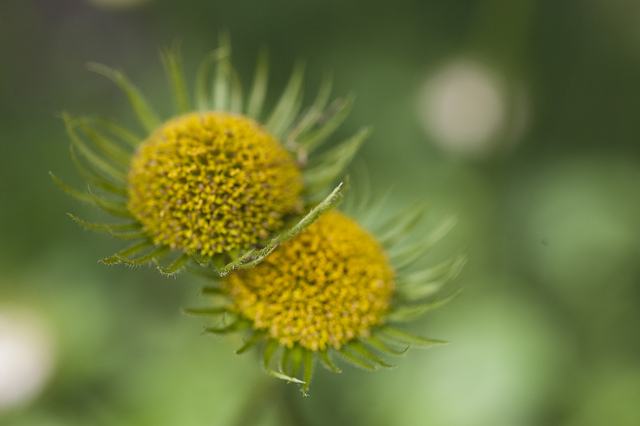This is the first in a series of summer stories that give a peek at what happens on the Elizabethtown College campus when most students and many faculty and staff members are elsewhere. This week we talked to Kate Chernich, grounds maintenance technician.
 Kate Chernich doesn’t pass much time in an air-conditioned office. As a matter of fact, a good portion of her summertime is spent out in the sun … and down in the dirt.
Kate Chernich doesn’t pass much time in an air-conditioned office. As a matter of fact, a good portion of her summertime is spent out in the sun … and down in the dirt.
The Elizabethtown College grounds maintenance technician has been devoting a lot of these past few steamy weeks to weed control – pulling up poison ivy from beneath trees, eradicating thistle from flower beds and making sure unplanned plantings don’t put down roots in inappropriate place. She also pays close attention, of course, to watering those plants that SHOULD be growing where they’re found.
W etting new florae, such as the magnolia tree planted this spring, is imperative for survival.
etting new florae, such as the magnolia tree planted this spring, is imperative for survival.
“They don’t have a full root system to support them,” she said about new plantings, adding that the water schedule depends on the weather, of course. “We monitor on a rainfall gauge and, then, we have a trailer with a big tank and go out two times a week to water, if needed.”
I like the diversity. … Each thing has something positive to offer.”
After three years at the Masonic Villages, Chernich came to the College in October 2013 to help care for the enormous variety of annual, permanent and perennial plantings flourishing next to and between campus buildings. Summer, when most students and many of the faculty and staff members are away, is a great time to catch up with plants gone wild. Less activity means Chernich and several student assistants can better watch after the diverse growth—from age-old pines to newly introduced bubblegum pink petunias.
“I do a lot of pruning in the summer, too,” Chernich said, noting that in addition to moist soil for plant health, botanical haircuts help keep shrubs, trees and flower beds more orderly.
No one really notices when plantings are properly pruned, she said, but, if something is out of place or overgrown, it quickly draws attention. “In normal winters I can get a lot of pruning done. Not this past winter,” she said of the heavier snows and all-around intense weather.
Chernich, who graduated from Elizabethtown in 1992 with a degree in psychology and, later, from HACC with a degree in ornamental horticulture, said she thinks about the psychology of plants and how they impact those who are passing by. “If they are disorderly and disorganized it can actually be stressful.” No one wants to walk across campus and see spiny thistle plants poking their ways through beautiful flowerbeds, she said.
Though E-town students aren’t walking across campus June through August, there are a lot of families touring the College and camp groups that have taken up temporary residence. The campus grounds need to look good for them.
 Elizabethtown College boasts about 60- to 70-percent native plantings, those indigenous to this particular growing area. The others are shrubs and flowers, planted annually, to add color to building entries and the campus perimeter. Though an all-native campus would be ideal, plant variety helps add to the color and shapes. “I like the diversity,” Chernich said. “Each thing has something positive to offer.”
Elizabethtown College boasts about 60- to 70-percent native plantings, those indigenous to this particular growing area. The others are shrubs and flowers, planted annually, to add color to building entries and the campus perimeter. Though an all-native campus would be ideal, plant variety helps add to the color and shapes. “I like the diversity,” Chernich said. “Each thing has something positive to offer.”
Annual planting starts at the beginning of May so growth and flowering is established before mid-May graduation. Those flower beds tend to have a more traditional look, which, Chernich said, help give the college a “campus feel.” Though not native, such as boxwoods and yew, they are almost expected.
In front of The James B. Hoover Center for Business, for instance, the Knock Out Roses and chamaecyparis, a type of cypress conifer, are what one would typically see around a big brick building at a College. In The Dell, marigolds send out brilliant color, as do the pink petunias around the Elizabethtown College sign on East College Avenue. But in front of Alpha Hall, bee balm, daylilies and coral bells offer up a more natural and casual look and are a great cover for critters and birds, Chernich said.
One thing she really watches out for, however, is invasive species, such as bamboo, that could take over a meadow area or woods edging within days if not tended. Weed control is a constant. “Weeds can take over pretty quickly,” Chernich said, pointing out that even natives can get out of control. “I put down a pre-emergent in the spring that helps. … And I spray Roundup. If you just pull weeds and leave a small piece, it will come back.” Thinning is important to keep beds visually appealing, as well. “I spend quite of bit of time deadheading,” Chernich said, referring to taking old flowers off plants so new ones can take their places.
Unfortunately, the grounds maintenance technician said, a big part of her summer is spent picking up trash, too.
“It’s not fun, horticulturally, but you can have the nicest plants and have everything pruned perfectly, and then a bunch of trash … It’s that that will draw people’s attention.”

